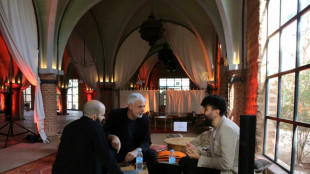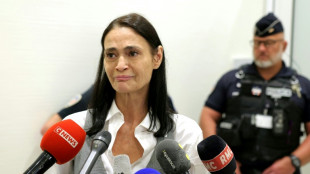
-
 Warhammer maker Games Workshop enters London's top stocks index
Warhammer maker Games Workshop enters London's top stocks index
-
Iran Nobel winner released for three weeks, 'unconditional' freedom urged

-
 Red Cross marks record numbers of humanitarians killed in 2024
Red Cross marks record numbers of humanitarians killed in 2024
-
Johnson's Grand Slam 'no threat', says World Athletics boss Coe

-
 Qatar's emir and UK's Starmer talk trade as state visit ends
Qatar's emir and UK's Starmer talk trade as state visit ends
-
Cuba suffers third nationwide blackout in two months

-
 Russia, Ukraine to send top diplomats to OSCE summit in Malta
Russia, Ukraine to send top diplomats to OSCE summit in Malta
-
Spanish royals to attend memorial service for flood victims

-
 LPGA, USGA new policy requires female at birth or pre-puberty change
LPGA, USGA new policy requires female at birth or pre-puberty change
-
Stick to current climate change laws, US tells top UN court

-
 British Museum chief says Marbles deal with Greece 'some distance' away
British Museum chief says Marbles deal with Greece 'some distance' away
-
Pope Francis receives electric popemobile from Mercedes

-
 Gaza civil defence: thousands flee Israeli strikes, evacuation calls
Gaza civil defence: thousands flee Israeli strikes, evacuation calls
-
Trump names billionaire private astronaut as next NASA chief

-
 Pidcock to leave INEOS Grenadiers at end of season
Pidcock to leave INEOS Grenadiers at end of season
-
Seoul stocks weaken, Paris advances despite political turmoil

-
 South America summit hopes to seal 'historic' trade deal with EU
South America summit hopes to seal 'historic' trade deal with EU
-
DAZN awarded global TV rights for Club World Cup

-
 Top executive shot dead outside New York hotel
Top executive shot dead outside New York hotel
-
Vaping while still smoking unlikely to help quitters: study

-
 British Museum chief says Parthenon Marbles deal with Greece 'some distance' away
British Museum chief says Parthenon Marbles deal with Greece 'some distance' away
-
'Creating connections': Arab, African filmmakers gather at Morocco workshops

-
 Iran frees Nobel winner for three weeks, sparking calls for 'permanent' release
Iran frees Nobel winner for three weeks, sparking calls for 'permanent' release
-
Brazil's Minas cheese gets added to UNESCO list

-
 Top US executive shot dead in New York City: media
Top US executive shot dead in New York City: media
-
Trump's nominee to run Pentagon hangs by a thread

-
 GM announces more than $5 bn hit to earnings in China venture
GM announces more than $5 bn hit to earnings in China venture
-
World chess champ Ding, teen challenger tied past halfway mark

-
 Georgia police raid opposition offices as PM vows to curb protests
Georgia police raid opposition offices as PM vows to curb protests
-
S. Korea opposition begins push to impeach president

-
 Syrian army fights rebel offensive with counterattack
Syrian army fights rebel offensive with counterattack
-
France court upholds Polanski acquittal in defamation case

-
 UK bans daytime TV ads for cereals, muffins and burgers
UK bans daytime TV ads for cereals, muffins and burgers
-
Palace's Guehi to face no formal action over 'Jesus' message on rainbow armband

-
 UK faces trade balancing act with Trump, EU
UK faces trade balancing act with Trump, EU
-
Iran releases Nobel Peace laureate Mohammadi on medical leave: lawyer

-
 UNESCO grants heritage status to Aleppo soap as Syria war flares
UNESCO grants heritage status to Aleppo soap as Syria war flares
-
Ghana's illegal mining boom seeps into presidential election

-
 Inconsistent Spurs 'progressing in all aspects': Postecoglou
Inconsistent Spurs 'progressing in all aspects': Postecoglou
-
France's Orano says Niger junta controls uranium firm

-
 Seoul stocks weaken, Paris edges up tracking political turmoil
Seoul stocks weaken, Paris edges up tracking political turmoil
-
China reports warmest autumn since records began

-
 French marine park to close over law banning killer whale shows
French marine park to close over law banning killer whale shows
-
Thousands march demanding S. Korea president resign over martial law debacle

-
 Taiwan romance novelist Chiung Yao dies at 86
Taiwan romance novelist Chiung Yao dies at 86
-
In Angola, Biden promises to invest differently to China

-
 Syrian army launches counteroffensive against rebels
Syrian army launches counteroffensive against rebels
-
Evenepoel says 'long journey' ahead after postal van collision

-
 South Korea's day of rage as Yoon's martial law founders
South Korea's day of rage as Yoon's martial law founders
-
UK police question killer nurse Letby over further baby deaths

| RIO | -0.16% | 63.41 | $ | |
| BTI | 0.44% | 37.194 | $ | |
| BP | -1.06% | 29.141 | $ | |
| CMSC | 0.15% | 24.596 | $ | |
| NGG | -1.14% | 62.26 | $ | |
| GSK | -1.06% | 34.535 | $ | |
| CMSD | 0.45% | 24.42 | $ | |
| SCS | -0.9% | 13.4 | $ | |
| RYCEF | 1.46% | 7.55 | $ | |
| AZN | -2.02% | 66.705 | $ | |
| BCC | -0.53% | 145.665 | $ | |
| JRI | -0.89% | 13.42 | $ | |
| BCE | -1.83% | 26.82 | $ | |
| VOD | -0.28% | 8.805 | $ | |
| RBGPF | -1.64% | 61 | $ | |
| RELX | 0.91% | 47.915 | $ |

Nobel scientist uncovered tiny genetic switches with big potential
Harvard geneticist Gary Ruvkun vividly remembers the late-night phone call with his longtime friend and now 2024 Nobel Prize in Medicine co-laureate Victor Ambros, when they made their groundbreaking discovery of genetic switches that exist across the tree of life.
It was the early 1990s. The pair, who had met a decade earlier and bonded over their fascination with an obscure species of roundworm, were exchanging datapoints at 11 pm -- one of the rare moments Ambros could steal away from tending to his newborn baby.
"It just fit together like puzzle pieces," Ruvkun told AFP in an interview from his home in a Boston suburb, shortly after learning of the award on Monday. "It was a eureka moment."
What they had uncovered was microRNA: tiny genetic molecules that act as key regulators of development in animals and plants, and hold the promise of breakthroughs in treating a wide range of diseases in the years ahead.
Although these molecules are only 22 "letters" long -- compared to the thousands of lines of code in regular protein-coding genes -- their small size belies their critical role as molecular gatekeepers.
"They turn off target genes," Ruvkun explained.
"It's a little bit like how astronomy starts with looking at the visible spectrum, and then people thought 'If we look with X rays, we can see much higher energy events,'" he added.
"We were looking at genetics at much smaller scales than it had been looked at before."
- Dismissed at first -
Their discovery had its roots in early investigations into C. elegans, a one-millimeter-long roundworm.
Ambros and Ruvkun were intrigued by the interplay between two genes that seemed to disrupt the worm's normal development -- causing them either to stay in a juvenile state or acquire adult features prematurely.
The genetic information contained in all our cells flows from DNA to messenger RNA (mRNA) through a process called transcription, and then on to the cellular machinery where it provides instructions on which proteins to create.
It's through this process, understood since the mid-20th century, that cells become specialized and carry out different functions.
But Ambros and Ruvkun, who began their work in the same lab before moving to different institutions, discovered a fundamentally new pathway for regulating gene activity through microRNAs, which control gene expression after transcription.
They published their findings in back-to-back papers in Cell in 1993, but at first, the discovery was dismissed as an esoteric detail, likely irrelevant to mammals.
"We were considered an oddity in the world of developmental biology," Ruvkun recalled. Even he had little idea their work would one day be celebrated by the wider scientific community.
That all changed in 2000 when Ruvkun's lab discovered another microRNA that was present throughout the tree of life -- from roundworms to mollusks, chickens, and humans.
- 'Celebrating like crazy' -
At the time, the human genome was still being mapped, but the portion that was complete was available to researchers.
"I think it was probably one-third done, and I could already see (the new microRNA) in that one-third of the human genome," said Ruvkun. "That was a surprise!"
Since then, the microRNA field has exploded, with more than 170,000 citations currently listed in biomedical literature.
More than 1,000 microRNAs have been identified in human DNA, and some are already being used to better understand tumor types and develop treatments for people with chronic lymphocytic leukemia.
Trials are also underway to develop microRNAs as treatments for heart disease.
On the morning of their Nobel win, the two old friends "Facetimed and high-fived," Ruvkun said. "It's magnificent, and we're going to be celebrating like crazy."
M.Odermatt--BTB


